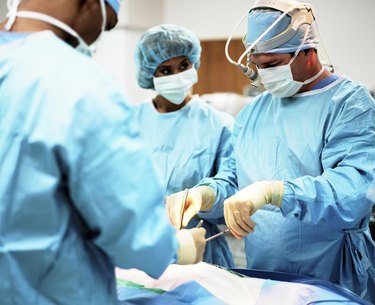
The removal of the gallbladder is a common procedure in which the organ is extracted from the abdominal cavity through a small incision, under general anesthesia. Although the surgery itself is relatively routine, the removal of the gallbladder takes away a part of the digestive process of the body. The role of the gallbladder is to provide bile acids for the digestion of fats. When the gallbladder has been removed, some people might have to make dietary changes in order to lose weight.
Step 1
Emphasize foods that are low in fat. According to Dennis Mungall of the Ohio State University College of Pharmacy, most people don't have difficulty losing weight following gallbladder removal, but if they eat high-fat foods that they were unable to eat before because of gallbladder issues, they could be ingesting more calories than they need. Eat lean proteins such as lean meat, skinless white meat poultry, beans and legumes, and avoid cooking meat with oil.
Video of the Day
Step 2
Increase your fiber intake. The website Family Doctor recommends that you eat at least 30 g of fiber every day. Fiber helps to restore your digestive processes, which maximize motility of food. In addition, fiber helps to fill your stomach, making you feel fuller for longer, so you will eat fewer calories. Dietary fiber also helps lower cholesterol and your risk of several chronic illnesses, such as cardiovascular disease. Speak with your doctor about adding fiber to your diet because you might need to do so gradually following surgery.
Step 3
Engage in 30 minutes of physical activity, such as brisk walking, cycling or swimming, at least five days a week. Exercise helps you burn calories and raises your metabolism so that you burn even more when at rest. Regular physical activity also can help to regulate your digestive process, allowing your system to restore its functioning after surgery. Check with your doctor to determine when you can resume physical activity and what type of activity is recommended.
Step 4
Calculate the number of calories you should consume daily, based on your age, gender, height and current level of physical activity (see Resources). Stay within the recommended caloric range, emphasizing fresh fruits, vegetables, whole grains, lean meats and low-fat dairy. If you are still not losing weight after a week, decrease the number of calories you eat each day by 10 percent. If after a month you aren't losing weight, speak with your doctor about testing for thyroid disease, which can cause weight gain.
Step 5
Drink at least 64 oz. of water every day. According to the University of Maryland, your body requires adequate water to perform all of its processes. These include digestion and metabolism, and if you aren't hydrated, both will slow, as will other important processes. Even mild dehydration can make you feel sluggish because you lack enough energy to function at your normal level. Water also helps to bind with fiber to fill your stomach and help you eat less.
Warning
Check with your doctor before making significant dietary or activity changes after surgery.
Video of the Day